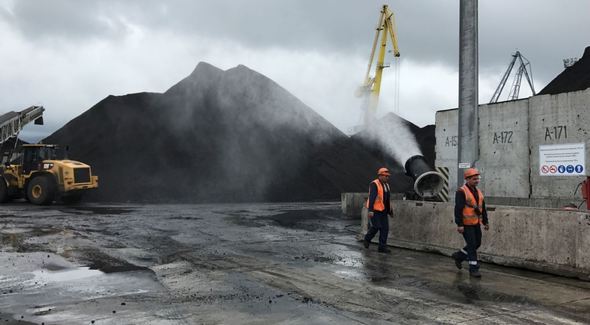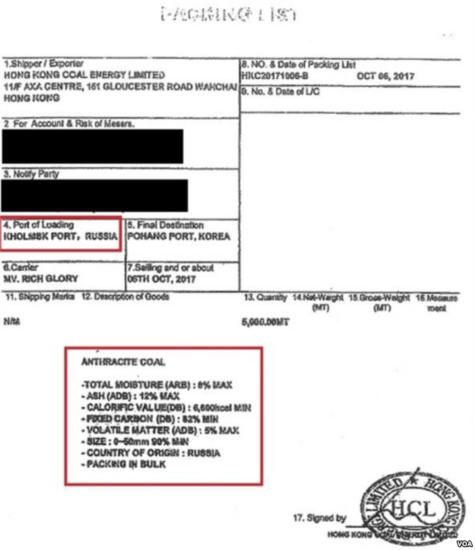 |
|
Coal spotted in Sept. at Russia’s Nakhodka port. The ports of Nakhodka and Kholmsk are suspected of being used to transport North Korean coal to South Korea. (Reuters)
|
UN sanctions committee says US$325,000 worth of NK coal entered South Korea last October
The South Korean government is currently investigating the Oct. 2017 arrival via Russia of 9,000 tons of coal believed to be of North Korean origin, it was learned on July 17. North Korean coal is subject to a ban on importation and exportation according to North Korea sanctions in UN Security Council Resolution 2371, which was adopted in Aug. 2017.
“Based on various pieces of intelligence, the UN [North Korea] sanctions committee panel views North Korean coal is having entered South Korea by way of Russia,” a Ministry of Foreign Affairs senior official told reporters on July 17, adding that Seoul was “currently looking into it.”
In an annual report published in April, an expert panel with the UNSC’s North Korea Sanctions Committee reported that the Sky Angel, a Panamanian vessel and the Sierra Leonean vessel Rich Glory respectively arrived at the ports of Incheon and Pohang on Oct. 2 and 11 of last year carrying North Korean coal loaded at a Russian port in Kholmsk.
 |
|
A report released by the UN Security Council Sanctions Committee on North Korea has identified ports at Incheon and Pohang as having received shipments of North Korean coal.
|
On July 18, however, the Voice of America (VOA) reported that both ships, although initially identified as Panamanian and Sierra Leonean, are actually operated by Chinese companies.
According to the report, vessels carrying coal from the North Korean ports at Wonsan and Chongjin unloaded freight at Russia’s Kholmsk port on six occasions between July and September of last year. With the 5,000 tons of coal loaded there onto the Rich Glory valued at US$65 a ton, this would mean a total of US$325,000 worth of coal brought into South Korea. The volume of coal arriving at Incheon was not specified in the report, but Ministry of Foreign Affairs authorities estimated it at “around 4,000 tons.”
The same official also said, “For both vessels, importation reports were submitted and received before intelligence was obtained [regarding the suspected North Korean coal on board], so [the coal] was apparently unloaded immediately upon their arrival.” This would mean the 9,000 tons of suspected North Korean coal carrying by the two vessels was imported and distributed through lawful procedures immediately upon their arrival in Oct. 2017.
The importation reports list the coal as being of Russian origin. The official acknowledged a “real possibility” the coal’s place of origin was changed to Russia as it passed through the country, but cautioned, “We will need to wait for the investigation report for a final answer on whether North Korean coal was brought into South Korea.”
Sky Angel, the vessel that’s suspected to have arrived at Incheon from North Korea via the Russian port of Khomsk, was identified at the time as a Panamanian ship. The company that operates it, however, is Dalian Sky Ocean International Shipping Agency Company, based in Dalian, in China’s Liaoning Province. Also, the telephone and fax numbers registered in connection with the ship both start with “86,” the country code for China.
The Rich Glory, which docked at Pohang harbor on Oct. 11 and was identified at the time as a Sierra Leonean vessel, is operated by Sanhe Marine Company Ltd, which is also based in Dalian.
After launching a probe of the vessels in question last October, the government is now conducting an investigation on the South Korean importation business in question.
“The Korea Customs Service is investigating possible illicit profits according to the Customs Act,” a Ministry of Foreign Affairs official explained. It has not yet been determined whether the company was aware the coal may have been North Korean when it was imported.
 |
|
Part of the report released by the UN Security Council Sanctions Committee on North Korea has identified Pohang as a point of transport for a shipment of North Korean coal.
|
The importation and exportation of North Korean coal is prohibited by UNSCR 2371, which states that North Korea “shall not supply, sell or transfer, directly or indirectly, from its territory or by its nationals or using its flag vessels or aircraft, coal, iron, and iron ore.” It also states that all countries “shall prohibit the procurement of such material from the DPRK by their nationals, or using their flag vessels or aircraft, and whether or not originating in the territory of the DPRK.”
South Korea has its own ban on trade with the North through the “May 24 measures” adopted in the wake of the 2010 ROKS Cheonan sinking.
If it is confirmed that North Korean coal was indeed brought into the South, it may be seen as a violation of the UNSC resolution. But the violation in this case would not have been made by the South Korean government, which would not be held accounted. If they deem it necessary, the UNSC member countries may target the South Korean business that imported the coal for sanctions – but this appears unlikely, as it would require the agreement of all 15 members, including China and Russia.
Addressing the suspected North Korean coal’s importation during a regular briefing on July 17, Ministry of Foreign Affairs spokesperson Noh Kyu-duk said, “The South Korean government is making the necessary diplomatic efforts for the diligent enforcement of UNSC resolutions sanctioning North Korea, working in close cooperation with the North Korea sanctions committee and the international community.”
By Kim Ji-eun, staff reporter
Please direct comments or questions to [english@hani.co.kr]











